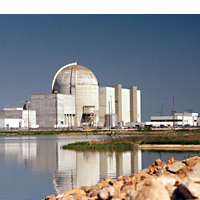40% of U.S. Nuclear Reactors Have Had “Near-Misses” Since 2010
 Wolf Creek Generating Station (nuclear reactor) (photo: U.S. Nuclear Regulatory Commission)
Wolf Creek Generating Station (nuclear reactor) (photo: U.S. Nuclear Regulatory Commission)
As President Barack Obama continues to pursue his “all of the above” approach for dealing with energy use and global warming, a newly released report raises serious questions about the safety of the nation’s nuclear power plants. According to the Union of Concerned Scientists (UCS), over the past three years 40 of the nation’s 104 nuclear reactors suffered one or more near-misses. A “near-miss” is an event that increases the chance of core meltdown by at least a factor of ten, thus causing the Nuclear Regulatory Commission (NRC) to send a special inspection team to investigate.
Entitled “Tolerating the Intolerable,” the third annual UCS report lays the blame on the NRC, which “has repeatedly failed to enforce essential safety regulations,” according to study author David Lochbaum, director of the group’s Nuclear Safety Project. Although the report acknowledges NRC’s programs to prevent the use of bad replacement parts and its emphasis on security, UCS also criticized the agency for lacking a strong “safety culture”, and failing to deal effectively with issues like temporary waste storage, recurring cooling water leaks, and flooding.
The NRC has pushed back, however, with spokesman David McIntyre insisting that the agency is doing its job because “none of the incidents cited by UCS actually affected public health and safety.” The NRC, which is completing its own 2012 report card for the nuclear industry, has decided that 99 of the 104 operating reactors were in the highest performance categories, 81 met all safety and security requirements and only 18 needed to resolve one or two low- risk issues.
The 14 near misses at 16 reactors detailed by the report that took place in 2012 include an electrical failure that compromised the cooling system and required a manual reactor shutdown at the River Bend Station near St. Francisville, Louisiana (10 mile radius pop.: 41,244); a cooling water leak at the Palisades plant near South Haven, Michigan (pop.: 34,103); security problems at the Farley plant near Dothan, Alabama (pop.: 17,006); and equipment failures at the Byron plant near Rockford, Illinois (pop.: 36,110).
Some facilities, such as the Wolf Creek reactor in Burlington, Kansas (pop.: 10,956) have reported multiple incidents since 2010, such as an electrical fault that caused the main generator to shut down.
-Matt Bewig
To Learn More:
Safety Breaches Seen Plaguing U.S. Reactors in Report (by Brian Wingfield, Bloomberg)
The NRC and Nuclear Power Plant Safety, 2012 Report: Tolerating the Intolerable (by David Lochbaum, Union of Concerned Scientists)
Livermore Moves Dangerous Nuclear Materials (by Ken Broder, AllGov California)
Safety Officer Fired for Shutting Down Dangerous Nuclear Reactor (by David Wallechinsky and Noel Brinkerhoff, AllGov)
- Top Stories
- Unusual News
- Where is the Money Going?
- Controversies
- U.S. and the World
- Appointments and Resignations
- Latest News
- Musk and Trump Fire Members of Congress
- Trump Calls for Violent Street Demonstrations Against Himself
- Trump Changes Name of Republican Party
- The 2024 Election By the Numbers
- Bashar al-Assad—The Fall of a Rabid AntiSemite






Comments